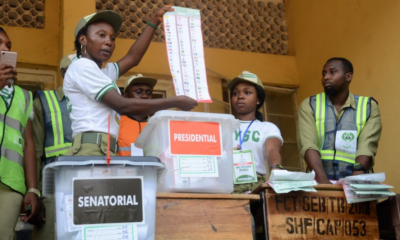GRTech
IGAD Commissions Ijesha Digital Hub to Help the Youth Upskill
The hub was launched in Osun State, reports SANDRA ANI


January 03, 2024, is a day will go down in history as the dawn of a new era in digitalization of Ijeshaland.
In a grand event attended by Ijesha royal fathers and eminent sons and daughters of the community, the Ijesha Global Alliance for Development (IGAD), a coalition of Ijeshas based in North America, Europe and in the Nigeria homeland, commissioned the Ijesha Digital Hub and inducted its first cohort of 107 trainees in Artificial Intelligence, Cybersecurity and UI/UX Design.
The hub, which is situated on the beautiful campus of the prestigious Olashore International School in Iloko-Ijesha, took the first critical step to transform Ijeshaland as the digital hub of excellence in the country.
On January 4, 107 of the best of the best Ijesha youths gathered in the state-of-the-art Ijesha Digital hub to begin their training as skilled workforce and techno-entrepreneurs in the emerging global digital economy.
The inauguration was graced by prominent speakers and community leaders, including two royal fathers, Kabiyesi Owaloko, and the Oniwoye of Iwoye-Ijesha, Asiwaju Yinka Fasuyi, the Asiwaju of Ijesaland, Mr. Supo Shadiya, President, Ijesa Development Council (IDC) and Dr. Adewale Obadare, Chief Visionary Officer and founder of Digital Encode, one of the leading Cybersecurity companies in Nigeria, Barrister Dupe Ajayi-Gbadebo, IDC Vice President, among others who shared their insights on the indispensability of technology in shaping the future.
Dr Adewale Alonge, Vice President, IGAD, and one of the visionaries behind IGAD, who moderated the highly successful event, in his welcome and introductory address noted that Nigeria with the largest youth population in the world, with a median age of 18.1 years faces either a demographic ticking time-bomb or a demographic economic windfall depending on the choice the country makes as it relates to investment in youth human capital development. He noted that IGAD’s Ijesha Digital Hub was an investment in Ijesha youth human capital as the driver of the Ijesha development agenda.
He noted that “The hub will serve as a gateway to opportunities, offering the means for sustainable livelihoods and the tools for scaling through the complex reality of the world.” The event also highlighted the importance of facilitating entrepreneurial drive and soft skills among the youth.
Dr. Wale Alonge emphasized, “We are not just training for technical proficiency; we are exemplifying entrepreneurship and soft skills. The hub will be a stimulator for innovation, with a focus on real-world applications.”


Prince Abimbola Olashore, Chairman of Ijesha Global Alliance for Development, conveyed his gratitude for the collaborative efforts that led to the hub’s establishment: “Today’s ceremony is just the beginning. I want to thank all IGAD members and the Executive Board for their contributions. The hub is set to transform our workforce, fostering economic growth and sustainability.”
The push towards global connectivity and technology was reiterated by the Chairman: “Making it global with technology is where we are today. The hub is breaking barriers and inspiring the youth to make informed choices. Our commitment is solid, and we are set to make a difference in the digital age.”
The Chairman continued, addressing the hub’s potential impact on employment: “We are proud to change the employment situation, especially in the current job market. This project aims to create a skilled workforce capable of thriving in the global economy. The hub is not just a physical space but a motivator for the nation, and beyond.”
The hub was built in pursuit of encouraging entrepreneurship, where individuals are investing their time, talent, and resources, collaborating with sponsors, and ensuring a smooth and impactful journey for the youth. This is about going beyond limits and making technology accessible globally.
Dr. Ayoola, Founder of Robotics and Artificial Intelligence Nigeria (RAIN) delivered the keynote speech on Mindset Shift for Digital Success: “The mindset shift is critical. Success is not just about acquiring skills but defining success in your terms. It’s about solving problems and creating opportunities.”
Dr. Ayoola emphasised the need for a positive mindset, stating, “If we do not achieve a mind shift, we will struggle in the midst of plenty. We have the human resources, but without the right mindset, we may not fully utilise the potential within us. The youth must define success on their terms and focus on integrity, not just jobs.”
The keynote speaker also highlighted the challenges and solutions ahead: “We are facing challenges such as security issues, economic struggles, and brain drain. The solutions lie in technology – from artificial intelligence to blockchain. The youth need to leverage these technologies to create solutions for the challenges our nation faces.”
“Today’s a memorable day for all of us. What is happening today is going to make digital innovation in Nigeria,” expressed Dr. Peter Adewale Obadare, the Chief Visionary Officer, Digital Encode, Limited, and one of Africa’s most credentialed cybersecurity experts.
Dr. Obadare shared a personal reflection on the power of technology, highlighting its role in overcoming challenges.
He noted the importance of skills in cybersecurity and technology, dispelling conventional notions of success portrayed by the media. Through real-world examples, he stressed that technology offers diverse paths to success beyond traditional fields.
“The only way to bridge the gap of poverty is through technology. The power of technology, coupled with the right skills, can elevate the youth from zero to unimaginable heights,” affirmed Dr. Obadare.
To succeed in the digital age, Dr. Obadare presented a 3D formula – Determination, Dedication, and Discipline.
He encouraged the youth to be determined in their pursuit, dedicated to acquiring relevant skills, and disciplined in facing challenges. Drawing from his experience, he reiterated that these qualities are key to success in the dynamic field of cybersecurity.
“Determination, dedication, and discipline are the keys to success. Apply these, and you will be a success story,” Dr. Obadare motivated the audience.
Dr. Obadare shed light on the opportunities in cybersecurity, stating that the world needs over 5 million cybersecurity professionals.
He urged the youth to embrace the program, noting that cybersecurity skills could lead to international job opportunities.
The induction ceremony also provided a medium for participants to express their aspirations. The Executive Director of IGAD, Dr. Cornelius Adewale, shared insights into the impact of the program, emphasizing the importance of dedication.
Participants from diverse backgrounds, including data science and programming, expressed their gratitude for the opportunity and their commitment to making a positive impact.
“This program has opened new possibilities for us. With dedication, we aim to impact our communities positively.”
Mr. Supo Shadiya reiterated the commitment of IDC to empowering Ijesa youths as the cornerstone its overall coordinating responsibility for Ijesha development.
The Vice President of Ijesa Development Council (IDC), Mrs. Dupe Ajayi Gbadebo addressed the importance of gender equity, acknowledging the significant role women play in technology. She urged the participants to challenge implicit biases and pointed out the need to include more women in the tech industry.
“Women are vital contributors to the tech industry. Let’s challenge biases and strive for inclusivity,” advocated the VP.
Asiwaju Yinka Fasuyi, the Asiwaju of Ijeshaland, who earlier on had been commended by various speakers for his catalytic and extraordinary leadership in the unprecedented development renaissance in Ijeshaland, commended IGAD for putting Ijeshaland on the map as one of the first communities in the country to launch its own digital workforce development initiative outside of the Federal government 3 million Tech-workforce program.


He reiterated Nigeria youth bulge challenge, nothing that with a youth population of 150 million, the FGN 3 million digital workforce skill acquisition project represents less than 2% of its youth population.
He therefore urged the trainees to take full advantage of the unique opportunity that has been offered them and make Ijesha proud.
He promised the support of the entire Ijesha community for the Ijesa Digital Hub initiatives.
Dr. Adewale Alonge invited two of the trainees (a male and female) to respond to all they had heard from the various speakers.
They both expressed their profound gratitude to IGAD for affording them this once in a lifetime opportunity.
They promised not to let Ijeshaland down. The vote of thanks was delivered by Mr. Adebanjo Adebiyi, a member of IGAD, via zoom from his base in Spokane, Washington, DC.
The induction ceremony at IGAD’s Ijesha Digital Hub was a spectacular success and it will go a long way in empowering Nigerian youth through technology.
This hub will go beyond building skills, to building a future where technology empowers and transforms lives.
-



 GRPolitics5 days ago
GRPolitics5 days agoLet the People’s Voice Stand: A High‑Assertiveness Call to Democratic Integrity in the Digital Age
-



 Culture5 days ago
Culture5 days agoGovernor Mbah Visits Igwe Greg Ugwu, Enyi 1 of Attakwu, Nkanu West LGA
-



 Sports5 days ago
Sports5 days agoBREAKING: Manchester United Sack Ruben Amorim
-



 News3 days ago
News3 days agoNiger State Attack: Mohamed Malick Fall Calls for Protection of Civilians, Schools









